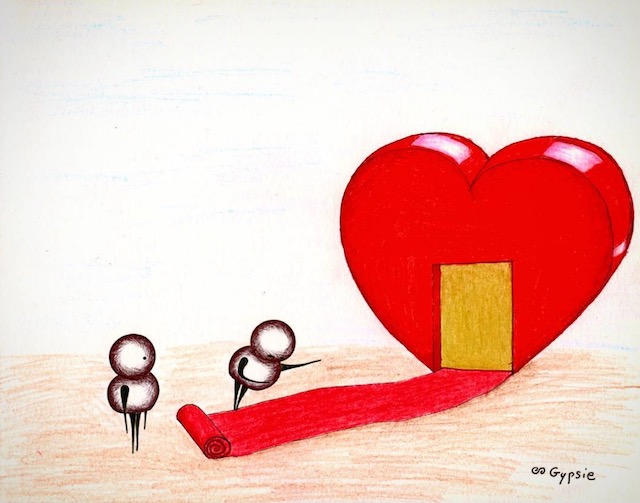What if being empathic is a superpower that, if misunderstood, can become an impairment?
Lately, I’ve been changing how I perceive my gift as a highly sensitive human being. I am writing the word “gift” although it has felt more like a burden, or even a curse, for most of my human existence.
Instead of appreciating people when they are present—as one would do with a work of art at a pleasant, respectful distance—I feel them as intimately as if I have had jumped right into their painting. Sometimes, it feels as if they and I become one—fusing our personal paintings into one glorious, chaotic mess of jumbled feelings.
Merging with another is not an understatement to an empath. If someone I am close to—not even personally but just physically—has a headache, often, so do I. If a co-worker or yoga student of mine is grieving, in their presence, I might suddenly feel a heavy sadness and want to cry.
When I did energy work sessions, I could feel my client hours before the session. For example, the last client I worked with was scattered and anxious. All day before the session, I found myself losing and misplacing things, irritable, and scattered. I was unable to stay focused on tasks, and I also did not eat enough that day. Unsurprisingly, my client was malnourished. Once she got on my healing table, it made sense: what I was doing the day before was connecting unconsciously with her energy field in a way that was automatic for me.
In the past, I’ve believed: “This is my gift. I feel other’s pain and take it on so that they may heal with more integrity.” Little did I know that my “taking on” became “taking in” to the point of absorption. That made me exhausted, and often ill, after a series of sessions.
Today, I think it’s selfish to take on others’ crap. My automatic pattern of absorbing peoples’ pain does not actually remove it. Instead, it transfers it from them to me.
Taking on their crap does not do them any good. It merely enables their disease and can be an impediment to their growth.
Today, I’d rather ask myself, “How do I connect with others without ‘hooking in’ to them?”
I’ve recently stopped dating and hanging out with people, except on rare occasions, because of this tendency to “hook in” which drains me.
I recently had a male friend sending me daily messages on Facebook to request to “get to know me better.” I had a feeling he was interested in me as more than a friend. Last week when I was ill, he offered to bring me some tea. With some hesitation, I accepted. I now realize that I hesitated because I sensed his empathic desire to remove my suffering—to heal my pain—and maybe in part that was a way of wooing me to see him in a romantic way. I was pleasantly surprised to find a dozen yellow roses and a heart stone with a sweet note in my mailbox along with the tea. The flowers and stone lifted my spirits, but only temporarily: my pain was my pain. For some reason, I was suffering.
A part of me was longing to be heard and he felt it. His kind act—the flowers, the healing tea, the heart stone, the texts—cut away my sadness. How often do we try and rescue those who are suffering with acts of kindness that melt away their pain in the moment, but only temporarily? My friend’s kindness acted like a band-aid, creating a barrier between me and my wounds. The only problem with all this was that I needed to feel and process my wounds to heal them.
I’m not trying to say that the kindness of strangers isn’t sending out positive ripples, or that showing love to ones you love isn’t okay. But, we all have to free our own selves. We all have to walk through our own discomfort.
Days after the flower delivery, this friend texted me to see how I was feeling. I know, it’s a normal friend response, but something felt off to me about it. I responded back out of guilt or obligation. My I want to please you and make you feel good and not hurt your feelings empathic self responded. I knew he would want more.
So I did not respond to follow-up texts, and it felt damn good. I then noticed he posted an old video playing music with his ex on Facebook where he mourned the loss of their connection. His grief and sadness were palpable. At first, my empathic self felt the heaviness of his sadness. I wondered: “Would texting him back have prevented him from posting this old memory? Would my energy have been the salve he needed to quell his grief?”
As I watched his video and let my feelings ride through, I got to a place of freedom: freedom from the obligation to take away the pain of another.
Today, as I write about this incident that happened over a year ago, I see that my lack of response was a gift. Instead of being a band-aid to him in the moment of pain, I became the ether that enhanced it. Instead of allowing my guilt and pity to guide my actions, I just accepted where he was. I was able to witness (via cyberspace) his pain to move through his mind and heart to come up and out.
Isn’t it enough to sit and observe like we do with our breath in a yoga pose, or like we see in our minds and heart? We are present. We ride the waves.
When a fellow human being rides the waves of sadness, can we observe with a compassionate smile without jumping on the surfboard with him? When we watch rather than surf with him, we become the lifeguard. With an open heart, clear mind, and still body, we become the one who offers a sense of peace.
How to show compassion.
Compassion is accepting that we are where we are meant to be in this moment. Compassion is acknowledging, without any judgement. It is pure and simple awareness. It is not fighting; it is flowing.
When we feel compassion, we honor. We honor ourselves and others as the greater whole.
Healing is a process.
Today, I feel compassion for my yellow-rose-receiving self. I feel compassion for her pain and sadness, and for the desire she had to remove the pain and sadness from another. I feel compassion for the woman in her who saw the struggle and wrestled with doing the right thing.
Today, I feel compassion for the well-meaning healer I was, who wanted nothing more than to take away another’s pain—physical, mental, and emotional. Today, that struggling healer has found herself in a new role as a compassionate listener: a therapist in a therapy room offering space for human beings to share their ills instead of taking their ills into her personal space.
Compassion is not a buzzword; it is the stuff the soul is made of. Compassion is the voice of who we are meeting the voice of the ego—be it pain, anxiety, fear, or depression. Compassion is the voice that says, “I love you. I trust you. I have complete and utter faith in you. I see your strength and beauty and courage, and my dearest friend, I believe in you. How could I not? You are the stuff this life is made of. I want you to see yourself through my eyes.”
Compassion doesn’t expect us to respond in any particular way. Compassion is the deep, dark, watery eyes of love that holds no boundaries or judgments.
Compassion is the master we all seek in our spiritual quest and the one most of us miss because the love is so subtle that we are often blind to it.
A Compassion Practice:
My friend, my deep feeling and contemplating empathic soul buddy, will you close your eyes for a moment and put your hand on your heart? Take a deep breath and try to smile. Hold yourself there in that soft place for a little bit. Breathe and feel. Do not expect anything.
That subtle pitter-patter you sense as quiet as a rabbit in the grass, that’s her: compassion’s gentle caress. Embrace it. Breathe it in fully. Sense it in all its delicacy. That softness, it is you. It is you living beyond the ruckus of the mind and the body noise.
Let its silky silence be with you for a little longer. Cuddle with it whenever you desire.
She is here for you: our girl, Compassion. Watery and deep, waiting for your eyes to meet. It’s okay if your eyes can’t meet hers. She won’t look away. She has never looked away.
Will you let yourself? Love her?
To her, you’re perfect, and that might be why it is hard to accept her presence sometimes.
Compassion will always be there.
Perhaps you fear that if you embrace her stare, it will melt you.
I’m not sure about you, but melting doesn’t feel scary to me anymore.
Relephant:
When we need to Limit Empathy in order to Heal.
~
Author: Sarah Lamb
Image: @gypsieraleigh on Instagram
Editor: Angel Lebailly
Copy & Social Editor: Khara-Jade Warren

 Share on bsky
Share on bsky





Read 15 comments and reply